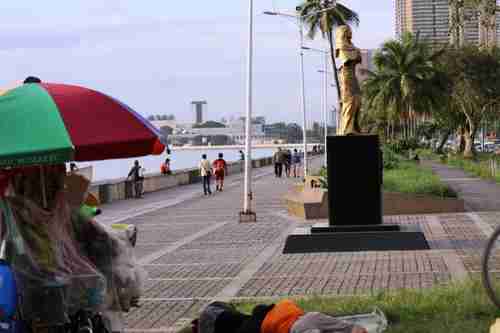This morning’s key headlines from GenerationalDynamics.com
- China funds unauthorized anti-Japan comfort woman statue in Manila, Philippines
- South Korea calls for renegotiating 2015 deal with Japan on comfort women
China funds unauthorized anti-Japan comfort woman statue in Manila, Philippines

Unauthorized comfort woman statue on Roxas Boulevard in Manila, the Philippines (Japan Forward)
An unauthorized statue representing a “comfort woman” during Japan’s occupation of the Philippines has been erected on Roxas Boulevard in Manila, usually reserved for statues of actresses and former presidents.
The statue was funded by a group of Chinese donors working in secret with a Philippines feminist organization. The statue was reported in Chinese media even before an unveiling ceremony took place on December 9.
On December 12, the Philippines Department of Foreign Affairs (DFA) sent a letter to the Mayor of Manila, with “requests for background information regarding the monument, including the process of erecting such monuments, and the circumstances that led to the erection of the “Comfort Woman” statue.” The mayor responded that the statue had been erected without a permit, and that no permit had been issued.
A similar statue in San Francisco has drawn retaliation from Japan. San Francisco and Osaka, Japan’s third-largest city, became sister cities in 1957, as part of a post-war effort to foster peace. Last month, the mayor of Osaka announced that they will end the relationship. Osaka mayor Hirofumi Yoshimura said, “Our relationship of trust was completely destroyed. I will dissolve the sister-city relationship.”
So far, no similar retaliatory measures have been taken against Manila or the Philippines for the Manila statue. Manila is a sister city of Yokohama, Japan, while Japan is the Philippines’ biggest partner in trade, investment, and official development assistance.
Although no permit has been issued for the statue in Manila, Teresita Ang See, identified as a “community and anticrime advocate” of Chinese ancestry in Manila, justifies the statue:
The Japanese occupation is a fact. The atrocities, persecutions, massacres, rape and other war crimes are facts. These we cannot and should not deny. There is a park at the corner of Anda and Gen. Luna Streets in Intramuros, put up by the Memorare Manila, to remember the more than 100,000 civilians killed during the Battle of Manila.
The Japanese say that they object to the statues because they are being singled out, when rape and sexual slavery are common in any war.
And the Japanese are absolutely right.
From the point of view of Generational Dynamics, rape, sexual slavery and other sex crimes are common in war, especially generational crisis wars, as a way of demoralizing the enemy.
Japan’s sex crimes are over 70 years old, but there are girls and women being sold as sex slaves in Libya today. These are Mideast and African refugees who come to Libya hoping to cross over to Europe. Instead, they run out of money to pay human traffickers and they get auctioned off in slave auctions. The men are auctioned as worker slaves, and the boys, girls and women are auctioned as sex slaves. That’s happening today, and I’m not aware of any statues being erected for them.
As a Chinese woman, Teresita Ang See statement about comfort women is probably motivated as much by her hatred of the Japanese and Philippines people as she is about her concern for the victims.
The hatred between Chinese and Philippines people is enormous, as was documented in a 2003 book World on Fire by Yale Law School professor Amy Chua. Chua was a member of the élite Chinese descent minority living in Manila, in an enclave walled off from ordinary Filipinos, whom she never saw except as servants living in filth in the basement of her family’s mansion. Chua described what happened after one of the servants murdered her aunt:
Each time I think of Nilo Abique—he was close to six feet and my aunt was four-feet-eleven-inches tall—I find myself welling up with a hatred and revulsion so intense it is actually consoling. But over time I have also had glimpses of how the Chinese must look to the vast majority of Filipinos, to someone like Abique: as exploiters, as foreign intruders, their wealth inexplicable, their superiority intolerable. I will never forget the entry in the police report for Abique’s “motive for murder.” The motive given was not robbery, despite the jewels and money the chauffer was said to have taken. Instead, for motive, there was just one word—”Revenge.”
My aunt’s killing was just a pinprick in a world more violent than most of us ever imagined. In America we read about acts of mass slaughter and savagery; at first in faraway places, now coming closer and closer to home. We do not understand what connects these acts. Nor do we understand the role we have played in bringing them about.
In the Serbian concentration camps of the early 1990s, the women prisoners were raped over and over, many times a day, often with broken bottles, often together with their daughters. The men, if they were lucky, were beaten to death as their Serbian guards sang national anthems; if they were not so fortunate, they were castrated or, at gunpoint, forced to castrate their fellow prisoners, sometimes with their own teeth. In all, thousands were tortured and executed.
Perhaps one of my readers from the Balkans can let me know if there are any statues being erected for the men who were castrated by their fellow prisoners with their teeth.
In the end, this whole comfort women issue is an opportunistic way to collect money from the Japanese, but it’s really all about the ethnic hatred that the Japanese, Chinese and Philippines have for each other. In the last war, it was Japan versus China and the Philippines. In the next war it will be China versus Japan and the Philippines.
So the Japanese are completely correct that they’re being singled out for things that are common in generational crisis wars.
History is written by the victors. America and the West were the victors in World War II, and American soldiers saved both China and the Philippines from being conquered, colonized and enslaved by the Japanese. The Japanese lost the war to the Americans and the West, and their crimes are being singled out. That’s the way the world works. Washington Post (25-Nov) and Japan Forward and ABS-CBN (Manila, 20-Dec) and the Standard (Philippines)
South Korea calls for renegotiating 2015 deal with Japan on comfort women
Civic groups in South Korea are demanding that a December 2015 deal between Japan and South Korea to settle the comfort women issue be repudiated, and a new deal be negotiated to obtain more money from Japan, as well as full acceptance of blame.
The 2015 agreement included a $8.8 million fund paid by Japan to help the victims. Anti-Japanese groups in South Korea claim that the 2015 agreement did not fully take into account the views of the victims, and that more money should be paid to them directly, rather than through the government. According to some reports, victims who accepted money from the fund were vilified by the anti-Japanese groups.
The agreement also called for the removal of statues of comfort women outside the Japanese Embassy in Seoul, and outside the Japanese consulate in Busan city, but those statues have not been removed.
The 2015 agreement was supposed to resolve the comfort women issue once and for all. Although all the activists’ demands were met at the time, some former victims were angry that they had not been consulted.
Japan’s foreign minister Taro Kono has reacted angrily to the demand to renegotiate the 2015 deal:
If (South Korea) tries to revise the agreement that is already being implemented, that would make Japan’s ties with South Korea unmanageable and it would be unacceptable.
The implication of this threat is that South Korea and Japan will not be able to work together to effectively counter nuclear missiles threats from North Korea.
South Korea’s foreign minister Kang Kyung-wha said, “Based on the findings, the government will gather opinions of the victims and others involved going forward with a focus to be placed on a victims-centered approach. In addition, action will be taken carefully in consideration of any impact that it could have on the relations between South Korea and Japan.” Yonhap (Seoul) and Reuters and Asia Times and the Atlantic (28-Dec-2015)
Related Articles
- Japan and China in confrontation over comfort women (07-Mar-2007)
- Chinese commemorate the 1937 Massacre at Nanking (Nanjing) (18-Dec-2007)
- China and Japan really DO hate each other (30-Aug-2013)
- China says ‘Fascist’ Japan must ‘abandon illusions’ about disputed islands (26-Sep-2012)
- China’s media ‘accidentally’ claims Philippines as part of China (10-May-2012)
KEYS: Generational Dynamics, Japan, comfort women, South Korea, Philippines, Manila, Roxas Boulevard, San Francisco, Osaka, Yokohama, Teresita Ang See, Libya, Serbia, Amy Chua, South Korea, Taro Kono, Kang Kyung-wha
Permanent web link to this article
Receive daily World View columns by e-mail

COMMENTS
Please let us know if you're having issues with commenting.